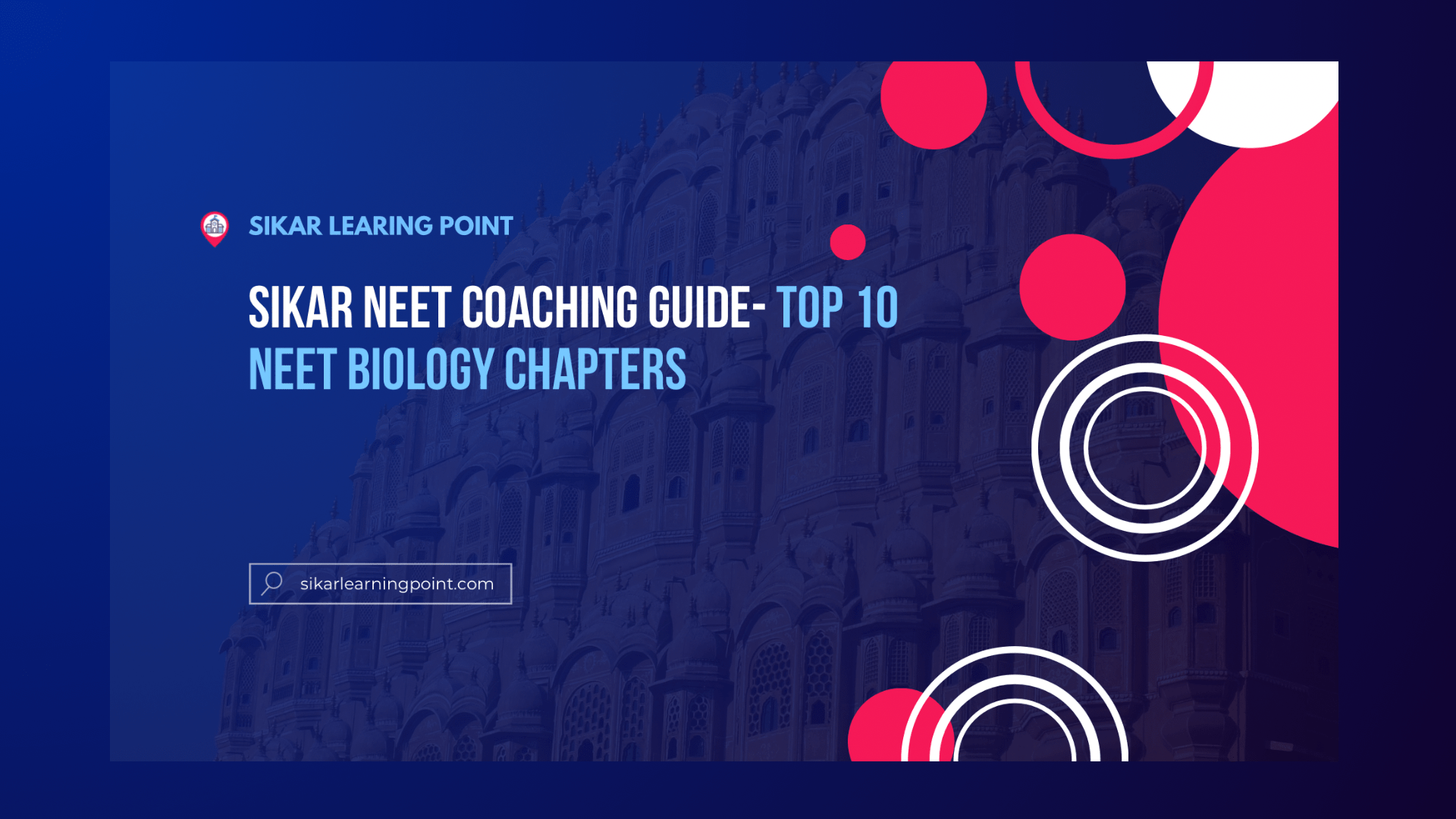Table of Contents
ToggleSikar NEET Coaching Guide- Conducted by the National Testing Agency (NTA), the National Eligibility cum Entrance Test (NEET) is a competitive medical entrance examination. Every year, several students appear for this exam to gain admission into prestigious medical colleges.
This year, the NTA conducts the NEET examination on Sunday, May 5, 2025. The duration for the exam will be three hours, i.e., from 2 PM to 5 PM. The examination will be held in pen and paper mode. Candidates are advised to visit the official website for the details.
Clearing the NEET examination unlocks various opportunities for candidates aspiring to pursue a medical profession. As a highly competitive national-level exam, NEET demands intense preparation.
Many Sikar NEET coaching institutions take the responsibility of training students efficiently so that they can achieve a higher score in the exam. They help students in their exam preparation process by providing a supportive environment. This is depicted in Sikar’s results every year, as they give out numerous All-India Rankers in the NEET and JEE exams.
List Of The Top Institutions | Sikar NEET Coaching
Here is the list of Sikar NEET Coaching Institutions that are known to be the best in the city for competitive exam preparation.
- Matrix Academy
- Allen Career Institute
- Gurukripa Career Institute
- Prince Career Pioneer (PCP)
- Career Line Coaching (CLC)
- Aakash Institute
These NEET coaching institutions are renowned not only for their high quality learning environment but also for consistently delivering outstanding academic results every year.
Distribution Of Marks for NEET Exam | A Sikar NEET Coaching Guide
The NEET exam consists of 180 questions, with a total of 720 marks. These 180 marks are distributed amongst three different subjects,
Physics, Chemistry, and Biology.
Candidates must study these three subjects thoroughly to achieve a high score in the NEET exam. The Physics and Chemistry section have 45 questions, carrying 180 marks each. The Biology section consists of 90 questions and is worth 360 marks. The total of all subjects combined sums up to 720 marks.
………
| Subject | Number of Questions | Marks |
| Physics | 45 | 180 |
| Chemistry | 45 | 180 |
| Biology | 90 (Botany 45 + Zoology 45) | 360 |
| Total | 180 | 720 |
The Biology section in the NEET exam carries the highest weightage. To help you with your preparation, we have compiled a list of the top 10 important NEET Biology chapters, identified by the Sikar NEET coaching institutes for their high scoring potential.
Top 10 Biology Chapters You Should Study Thoroughly | A Sikar NEET Coaching Guide
In Sikar, NEET coaching institutes know that Biology is the ultimate score booster. With the 50% weightage in NEET, a thorough preparation of the high weightage chapters can be beneficial.
Below is a list of all the top 10 must-study Biology chapters based on the number of questions and the trend in NEET exam pattern. Focus on these topics deeply, and we’re sure that you will achieve the highest score.
1. Reproduction in Organisms, Plants, Humans and Reproductive Health
This topic greatly emphasises on reproduction involved in various organisms including plants and humans. This section carries 14-15% of the weightage
⭐ Tips:
- Study the basic organs, cells, hormones, and parts involved in reproduction.
- List down the important points and memorize the diagrams.
- Some important sections include the human reproductive system (Male and Female), Double fertilisation in plants, Pollination and its types, Gemmule formation, etc,.
2. Human Physiology
In the NEET exam, around 12 to 15 questions come from human physiology. This section covers topics such as digestion, respiration, circulation, control and coordination. Each of these topics are interconnected.
⭐Tips:
- Human physiology involves complex concepts and numerous scientific terminologies. To simplify learning, students can create concise flashcards in their notebooks while studying each topic.
- Make flow charts to revise and learn faster.
- It is also suggested to memorise and practice diagrams.
3. Ecology and Biodiversity conservation
This typically includes biodiversity conservation of living organisms and some aspects of ecology. It carries around 10-12% of the weightage.
⭐Tips:
- Prepare flowcharts of various nutrient cycles such as nitrogen cycle, carbon cycle, and phosphorus cycle.
- Keep a track of keywords involved in this section. (this section has a high scoring potential).
4. Human health, diseases, and welfare
This section covers about 10% of the biology syllabus. It involves topics related to human welfare. The section also includes diseases such as malaria, cancer, tuberculosis, etc.,
⭐Tips:
- Understand topics like plant breeding, hybridisation, bio fortification, etc.,
- Focus on dairy, poultry and fish farming.
- Memorise various key terms related to MOET, inbreeding, outbreeding, symptoms of diseases, and their cures.
5. Genetics
This topic, covering both genetics in Botany and Zoology, carries 16% weightage in the biology section. Studying it thoroughly is important to achieve a higher score.
⭐Tips:
- Focus on topics, such as translation, transcription, central dogma, etc,.
- Study Mendel’s theory of genetics, Pedigree analysis, inheritance by preparing small charts.
6. Biotechnology
This section is simple and high-scoring covers 8-10% of the Biology section. The questions asked often revolve around PCR techniques, DNA fingerprinting, and GMOs (Genetically Modified Organisms).
⭐Tips:
- Understand the process involved in PCR and DNA fingerprinting.
- Try to memorise and retain information about GMOs. Also focus on learning their scientific names.
7. Plant Physiology
Plant Physiology accounts for 8-10% weightage of the Biology. It is challenging, though an important area for scoring high. It include topic like photosynthesis, plant growth, mineral nutrition, plant water relation, growth hormones, etc.,
⭐Tips:
- Focus on plant related terminologies like osmosis, diffusion, transpiration, etc.,
- Photosynthesis has extensively in-depth cycles. To learn those, make flow charts and short forms of chemicals or substrate involved.
- Learn metabolic cycles thoroughly.
- Highlight growth hormones involved along with their utilisation.
8. Morphology of Flowering Plants
This section involves in detail study of anatomy of flowering plants. It has a weightage of around 8 to 10% in the biology section.
⭐Tips:
- Study the morphological features of flower, leaves, stem, etc.,
- To study this portion, sketch rough diagrams of each. (Aestivation of flowers, placentation, etc.,)
9. Cell Biology
Making the base of Molecular Biology, this is another important chapter from the NEET exam perspective. This section involves structure and function of cell organelles, cell cycle, and cell division. Cell biology is involved in both Botany and Zoology.
⭐Tips:
- For Botany, section, learn about different plant cells and their functions ( Parenchyma, Sclerenchyma, etc.,
- For Zoology study, focus on different types of cells, such as, squamous epithelium cells, striated epithelial cells, etc.,
- Do not skip topics such as Mitosis and Meiosis in both plants and animal cells.
10. Origin and Evolution
Covering about 8%-10% of the Biology section, Origin and Evolution is a very scoring and easy topic.
⭐Tips:
- Focus on topics, such as gene flow, gene regulation, et cetera
- Study the origin of life, theories of evolution (Darwin, Lamarck).
- Study about fossils, anatomy, biochemistry, involved in origin, and evolution of species.
Final Thoughts | Concluding Your Preparation Towards Performance
The chapters that we have highlighted not only carry the highest weightage in NEET, but also feature the most high scoring questions. While it is strongly encouraged that you cover every topic in the NEET syllabus, these 10 chapters deserve a little more prioritisation.
However, under no circumstances, you should skip or under prepare any other topic in the NEET syllabus. Sikar NEET coaching institutes recommend that mastering these key chapters will give you a benefit over thousands of aspirants. To maximise your success, these institutes also suggest the following steps:
- Focus on NCERT syllabus or any other book that is aligned with the same.
- Do not overburden yourself with numerous reference books.
- Create a flowchart and revise diagrams regularly as visual memory boosts retention.
- Practice Previous Year Questions (PYQs) and MCQs on a regular basis.
- Revise topics from time to time.
- Most importantly, schedule breaks and rest to keep your mind fresh for effective study time.
…………
By combining focus, chapter-wise preparation and smart study habits, you will definitely transform your NEET Biology score.
Also read our latest blogs
- JEE Main 2026 Session 1 Result: Download Scorecard (Live)
- NEET Coaching in Sikar: Is It the Right Choice for Your Preparation?
- Best Schools In Sikar: Matrix High School, Euro, and more | 10th Result Breakdown
- JEE Advanced 2026: Exam Tips from Sikar’s Top Faculty
- Schools in Sikar: Top 10 FAQs By Parents Answered




